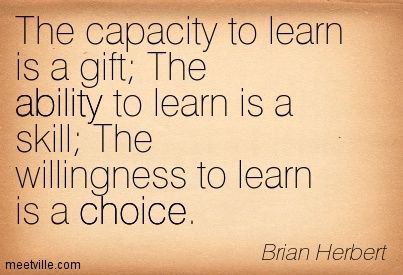

We are preparing our students for jobs which perhaps don’t exist yet. We need to teach them how to adapt and not simply learn by memorization.

Often when I’m working with a new cohort of educators, I’ll give them this list and ask them to rank them in order of importance.
Information Literacy
Critical Thinking / Problem Solving
Developing an Academic Mindset
Mastering Core Academic Content
Collaboration
Communication
Creativity & Innovation
They have to be ready to defend their rankings. This activity always leads to lively discussions. I think I have heard each one on the list argued as the most important, but the majority of the time Critical Thinking and Problem Solving is near the top. If students can’t think critically, then they can’t identify problems, research possible solutions, solve the problem, or communicate the results. If they can’t think critically, how effective are their collaboration skills? Rote memorization used to be a key skill for being successful in school. But how much of that translated into success after school? Now, with the world at our fingertips, we need to teach students to be critical thinkers instead of placing all of the emphasis on memorizing academic content.
This is where metacognition comes into play. There are many facets to enhancing critical thinking and problem solving skills, but metacognition plays a large role. Educators need to make metacognition a regular part of the learning experience. How regularly do we ask students to think about their thinking, thereby thinking about their learning? This is very similar to the strategies for intentional reflection I have written about previously. Much is learned through the reflective process because we are pausing with the intention to grow. There are several metacognitive cycles out there to use for engaging your students’ thinking processes. I’m a bit partial to one shared by John Spencer:
The difference between a reflective cycle and a metacognitive cycle, is that reflection typically comes at the end. We want to teach students to think about their thinking and learning before, during and after the learning experience. That’s why I like this cycle. It fosters critical thinking skills throughout the entire process. Students are given a task (or better yet, develop their own task/goal/outcome) and first have to think about it. What are the strengths and weaknesses of each learner involved and the information they have available for the work? Then, comes the planning part. How will they utilize those strengths, overcome the weaknesses, and address the task at hand to solve a problem? Once the plan in is place, they are ready to apply the determined strategies. And all good learning ends with that reflection. We want this cycle to be internalized, so that students learn how to apply it without a teacher instructing them through each stage.
The Teaching Innovation Progression Chart shows students in the ideal student-driven classroom extending knowledge and skills in practical ways to solve real world problems. They have to generate and respond to purposeful questions, justify their decisions and practices, and apply digital tools to address authentic tasks. Teachers provide activities, experiences and feedback for students to help them develop critical thinking and problem-solving strategies.
We aren’t training students for specific jobs anymore. New careers are being created daily. Our students have to learn how to function, contribute and success in this constantly-evolving world. The learning experiences offered in classrooms need to reflect that and give students the opportunity to leave the school fully-equipped for any role. New skills can be learned if the learner has the critical and creative thinking skills needed to identify problems, adapt to new situations, and work to solve situations they are faced with.
People are still referring to the 4 Cs as “21st century learning skills”. Today’s students were all born in the 21st century. Other people refer to the same skills as “future ready”. While I like that terminology a bit more, I think it misplaces the responsibility a bit. We need to prepare our students to be ready for life. And they are living their lives now. If we are giving them opportunities to drive their own learning, and helping them build their skills as critical thinkers and problem solvers, then they will be ready for all the future brings, enabling them to be successful in life as they live it.